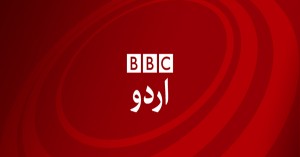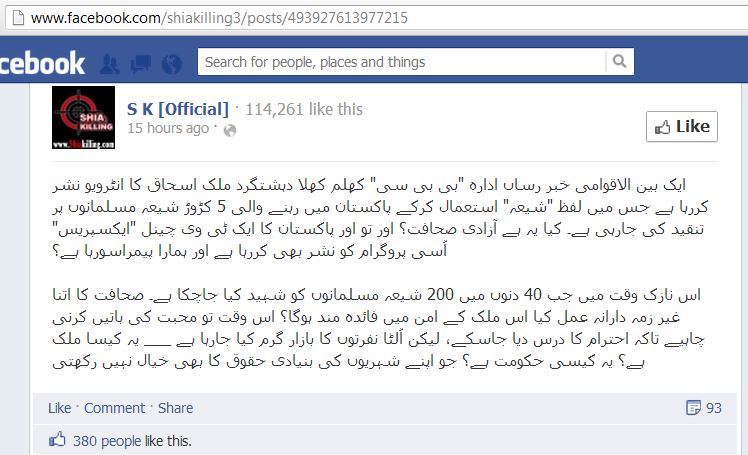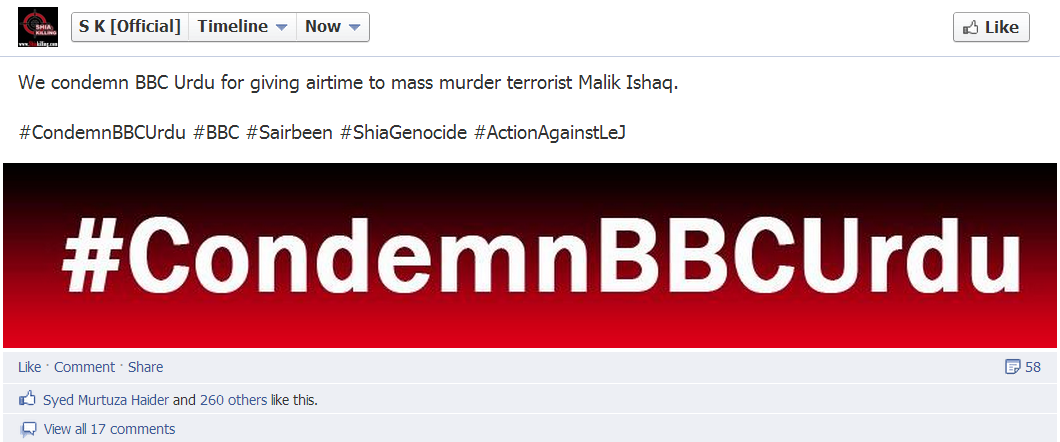Shia-hunter Malik Ishaq gets free airtime on the BBC Urdu – by Sidq Maqaal
Question: So what is the LeJ’s Founder (currently vice president of ASWJ) Malik Ishaq Deobandi doing when he is not whipping up passions, to kill Shias, with incendiary hate speeches?
Answer: He is giving interviews to respectable international channels like the BBC Urdu.
Link to BBC Urdu: http://www.bbc.co.uk/urdu/multimedia/2011/10/000000_sairbeen.shtml
There are, of course, both moral and social grounds on which one can fault the BBC Urdu for airing an interview with Malik Ishaq who openly calls for Shias, a major Muslim sect, to be put to death. Allowing this Pakistani apostatizing militant and hatemonger free airtime on a major international channel is not only an affront to millions of Shias and Ahmedis, who Mr Ishaq declares as liable to be killed, but also further inflames hard-line views among his followers. This amounts to helping this man and his murderous terrorist group to capitalize on its hate campaign.
While we do respect the BBC’s high ethical standards, it would not be out of place to condemn this act as a folly in careless feeding. We feel that by allowing Malik Ishaq the use of its platform, the BBC did not serve any social cause. All terrorists and extremists view such airtime as an information instrument, to generate publicity and draw attention to their cause. This fatal attention is a critical component of understanding the concept of terrorism and explains why terrorist are drawn to the media. Thus the media and the resulting coverage serve as an enabler for acts of violence and terrorism. The primary questions of journalistic ethics that surface when evaluating the BBC’s decision to air Malik Ishaq’s interview surround the nature of this concept known as “news value.” Under what pretext the news value of this item can override other ethical concerns associated with giving publicity, of no informative worth, to a wilful and violent hatemonger? It allows him to create an image for himself and to expand the reach of his message. Thus the broadcast will sow contamination and influence for a man who is charged with having ordered and committed monstrous acts of brutality and terror.
Doesn’t giving a terrorist a legitimate platform merely magnify the reach of his hateful message?
Did the BBC take the decision responsibly and with awareness of the impact it would have on victims’ families from the recent bomb blasts in Quetta and Hangu and in many other Shia massacres that LeJ has overtly owned up to?
Does the BBC understand the shock and violence suffered by the families of the victims in seeing live and hearing the voice of the man who ordered assassination of their loved ones, many of them small children and women?
Some of the victims’ relatives and friends have called LUBP to express outrage after this broadcast. “This broadcast is scandalous because it gives the voice to LeJ which has claimed the ‘honour’ of blowing up and reducing to bones and ashes our little children” said Fatima Changezi, the mother of a young girl who was burnt alive in the Quetta explosion on the 16th instant.
We do hope that the BBC will take our concerns seriously and that such instances will not be repeated.
Reaction by Shia Killing website:
https://lubpak.com/archives/242629
https://lubpak.com/archives/245509












Shame on BBC Urdu, in particular on Aamir Ahmed Khan, Tahir Imran Mian, Ali Salman and others who obfuscate Shia genocide.
Thousands of Shias have been murdered by these terrorist . It is an irresponsible behaviour on part on BBC to give terrorist organisations and people representing them free air time
shame on bbc urdu.. they are the real sopporters of ssp and lj…or han kuttay ke olad malik ishaq ager yazeed or is ke party tumhary sahabi han tu ta qayamt chowk chorahay pay akay bura kahay geya.. mard ka bacha ha tu roko…
I made a review of this work from no home program. If you’re interested in making some money, you’ll definitly want to check this video out.
Jang Group / The News enables further Shia genocide by publishing hate Shia interview by Ahmed Ludhianvi.
“The country should be declared a Sunni state”
— Maulana Muhammad Ahmed Ludhianvi, Chief of
Ahle Sunnat Wal Jamaat (ASWJ)
By Waqar Gillani
The News on Sunday: How do you look at the rising wave of sectarianism in Pakistan these days?
Muhammad Ahmed Ludhianvi: In my view, these acts are being undertaken by foreign and external elements, aimed at weakening Pakistan. We think this government has completed its term and there should be no conspiracy to cause delay in the elections. Black Water, the US, India, Israel and Iran are behind these blasts to destabilise Pakistan. Many of the accused arrested by the Pakistani authorities in Karachi, according to our information, were trained in Iran. We always condemn the killing of innocent people. We urge the Supreme Court of Pakistan to deeply look into these matters to understand the conspiracies behind these incidents.
Why only Hazaras are being targeted in Quetta when other Shiites also live in Quetta? This is surprising for us. There are many in-fights within that community which has roots in Afghanistan. Conspiracies are being hatched to separate Balochistan from Pakistan. We, for the sake of peace, have also held a peace conference in Quetta on the platform of Difa-e-Pakistan Council (DPC), an alliance of more than 30 religious parties.
TNS: There are reports in the media that LeJ, a militant group that emerged from SSP and is stated to be close to ASWJ ideology, has accepted responsibility of these attacks on Shias.
MAL: We have, many times, categorically stated that ASWJ (Ahl-e-Sunnat Wal Jamaat), the party which I am leading at the moment, has nothing to do with Sipah-e-Sahaba Pakistan or Lashkar-e-Jhangvi. I can challenge this allegation on any platform. This is beyond imagination for us how the LeJ, like the Taliban, sends their messages to the media, claiming responsibility of such attacks.
The LeJ and Taliban seem as if they are a creature hanging between the earth and sky because our intelligence and law enforcement agencies fail to trace them. They have failed to trace the killers of innocent Shias and Sunnis. We believe that you cannot crush anybody with power and the ultimate solution to these issues, always, is to sit on the table and talk.
TNS: What’s your take on the government targeted operation against terrorists?
MAL: We believe targeted operations cannot resolve this issue. Just take the example of ANP which, ultimately, has gone for a dialogue with Taliban. The solution lies in talks and not in targeted operations. There is need for a consensus strategy and I believe it is high time the government called an All Parties Conference to discuss the issue of sectarian killings. In 1996, religious parties formed the Milli Yakjehti Council (MYC), comprising all religious parties, including the Shia parties. They agreed to a code of conduct. The sectarian issue was resolved to a reasonable extent. There was a decrease in violence.
Recently, late Qazi Hussain Ahmad, also wanted to form a council of religious parties on similar grounds but, unfortunately, he passed away. There was not much disagreement between LeJ and SSP on that code of conduct.
TNS: It is said that some elements in the SSP disagreed with the idea of forming MYC and ultimately formed LeJ, targeting Shias. Later, there were reports in the press that you, on the request of then Punjab government, met the chief of LeJ, Malik Ishaq, in jail to make an agreement that he would remain inactive after his release.
MAL: It is true that I met Malik Ishaq, chief of LeJ, in jail a couple of times and he promised me not to be violent if he is released. I challenge the accusation that Malik Ishaq is involved in sectarian or any other kind of violence after his release. A few days ago, some Shia groups tried to attack him during a wedding ceremony and a public procession and some of his activists were injured but they did not respond to the attack. So, we should not create a situation which forces such people to defy the policy of peace.
TNS: Does ASWJ have political ambitions?
MAL: Yes. We have become part of Muttahida Dini Mahaz (MDM), currently led by Maulana Samiul Haq. It is an alliance of six religious parties and our agenda is to resolve the issues politically by entering the parliament rather than coming on roads and staging protests. The manifesto of MDM would be launched very soon. On this platform, we also want a solution to sectarianism through effective legislation. We believe that nobody should be allowed to utter derogatory remarks against companions of Prophet Muhammad and there should be a strict punishment if any person commits this blasphemy. This demand is close to Namoos-e-Sahaba and Ahle-Bait Bill once presented by late Maulana Azam Tariq in the National Assembly.
TNS: There are reports in the press that you are also in contact with the PML-N for electoral alliance. Are you planning alliances at the national, provincial or local level?
MAL: Since we have political motives and the MDM has decided to contest the upcoming general elections, we are in contact with many political parties, including the PML-N. We want to make an alliance with the parties which are close to our ideology and understand our point of view, parties that vow to protect the ideology of Pakistan. These alliances can be at any level if the other side agrees to our manifesto.
We believe that the ruling coalition, led by the PPP, has created a mess in the country. It is high time they announced the schedule of elections. We believe that these terrorist and sectarian incidents are a plan to delay the next elections. A free and fair caretaker set-up can maintain the law and order. If a free and fair caretaker set-up is not there, the situation might become even worse.
TNS: How close is the PML-N to your ideology and objectives?
MAL: The PML-N is not very close to our ideology, but, at the same time, it is not very far either.
TNS: On how many seats do you plan to make an alliance to contest general elections?
MAL: We have decided to field candidates on about 20 seats. Currently, we are aiming to contest elections in Jhang, Khanewal, Muzaffargarh, Bahawalpur in Punjab, Tando Allah Yar, Mirpur Khas, Karachi, and Khairpur in Sindh, Peshawar, Dera Ismael Khan, Batgaram, and Kohat in Khyber Pakhtunkhwa. We have decided our candidates for these areas. From Jhang, I will be the candidate for the National Assembly seat against Sheikh Waqas Akram.
TNS: The SSP has also been demanding that Pakistan be declared a “Sunni State”. To what extent do you have this agenda in your objectives?
MAL: We believe that Sunnis have a clear majority in Pakistan. They are 97 percent of the total population of the country. The country should be declared a Sunni state and all the Sunni factions can make rules accordingly. The president, prime minister, chief justice of the Supreme Court and all other offices should be held by Sunnis. You can take the example of Iran where Shia are in majority and they have declared the country a Shiite state. If they can do it why we cannot go for this? Shia, in Pakistan, should be declared a minority and they can live peacefully like other minorities.
http://jang.com.pk/thenews/Feb2013-weekly/nos-24-02-2013/spr.htm#1